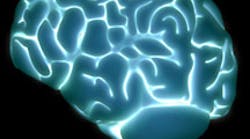The link between light levels and emotional health has long since been established, but the results of a five-year Dutch study — published in the June 11 issue of JAMA, The Journal of the American Medical Association — show higher light intensities may also counteract dementia. According to the National Institutes of Health, Bethesda, Md., dementia is a term for a collection of symptoms that can be caused by a number of disorders that affect the brain, including Alzheimer's disease.
In addition to frequently disrupting sleep/wake cycles, dementia causes deterioration of cognition, mood, and behavioral organization. The 1999-2004 Dutch study explored these issues by comparing the impact of lighting on a sample comprising 189 residents of 12 assisted-care facilities. The residents — 90% of whom were women — averaged 85.8 years of age; 87% had been diagnosed with dementia.
Higher-wattage lamps were installed in ceiling fixtures of six facilities. The new lighting produced 1,000 lux equivalent to 93 footcandles, or around 50% more than the illuminance commonly found in many open-office areas. In the remaining six facilities, indoor lighting produced approximately 300 lux. In all 12 facilities, the lighting was used in “whole-day” mode (9 a.m. to 6 p.m.). Additionally, one group was given 2.5 mg of melatonin each evening, while another received a placebo. All subjects were randomized to treatment.
According to the report, the 1,000-lux lighting alone reduced cognitive decline by 5%, symptoms of depression by 19%, and physical functional decline by 53%. Although those who took melatonin gained 25% more uninterrupted sleep, melatonin alone tended to aggravate withdrawal and depression. The higher levels of whole-day lighting combined with melatonin increased sleep efficiency by 3.5%, reduced nocturnal restlessness by 9%, and reduced agitated behavior by 9%.
Quoted in the June 10, 2008 issue of Time, one of the study's authors — Eus Van Someren at the Netherlands Institute for Neuroscience — said, “I had expected, based on previous studies, that we would find improvements in sleep. But I hadn't expected to see the effect on cognition.”
Van Someren also noted that, because the cognitive gains were about the same that Alzheimer's patients achieve by taking cholinesterase inhibitors, “…it may make sense for people to consider living in a better-lit environment.”



